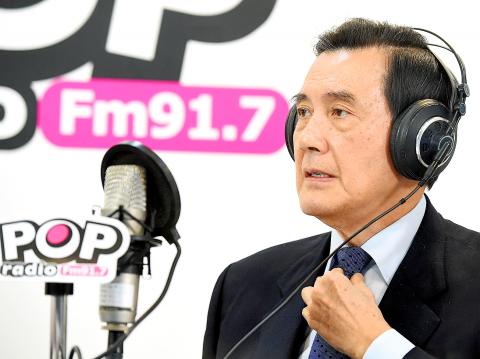The Chinese Nationalist Party (KMT) must clarify its stance on the so-called “1992 consensus,” former president Ma Ying-jeou (馬英九) said yesterday, adding that Chinese President Xi Jinping’s (習近平) definition of the term is different from that of the KMT’s.
Ma made the remarks during an interview with Pop Radio talk show host Huang Kuan-chin (黃光芹) the day after Xi in a speech in Beijing announced a plan to explore the “one country, two systems” formula for Taiwan and said that “national unification” is part of the “1992 consensus.”
While Xi’s view of the “consensus” differs from that of the pan-blue camp, the basic outline remains the same, Ma said.

Photo: Chu Pei-hsiung, Taipei Times
Xi’s continued emphasis on unification reflects a personal sense of urgency, as he had in 2013 stated that the issue should not be put off from generation to generation, Ma said.
Xi’s comments were a direct response to President Tsai Ing-wen’s (蔡英文) “four musts” in her New Year’s address, Ma said, adding that her rhetoric is causing the two sides to drift further apart.
Ma rejected the notion that acknowledging the “1992 consensus” equates to embracing the “one country, two systems” concept, saying that the KMT’s definition has always been a stop-gap prior to unification.
The clause “with each side having its own interpretation of what ‘China’ means” is only an issue prior to unification, and would not be a problem afterward, the former president said.
Ma criticized Tsai for misunderstanding the “consensus” and said that while Taiwan should maintain the “status quo,” it should not be averse to negotiating unification at the right time.
Former president Chiang Ching-kuo (蔣經國) responded to former Chinese leader Deng Xiaoping’s (鄧小平) “one country, two systems” proposal by saying: “A country needs only one good system,” Ma said.
The “1992 consensus” is the most important political foundation for cross-strait relations, Ma added.
He dismissed a question asking if he would hypothetically represent the KMT to respond to Xi’s proposal to “negotiate the ‘two systems’” and declined to comment further.
Ma also called on Tsai’s administration to allow local governments to initiate talks with their Chinese counterparts.
Local governments cannot represent the central government when negotiating policy, Ma said, adding that even when former KMT chairman Lien Chan (連戰) met with then-Chinese president Hu Jintao (胡錦濤) in 2005, they only exchanged visions of the future.

Taiwan is stepping up plans to create self-sufficient supply chains for combat drones and increase foreign orders from the US to counter China’s numerical superiority, a defense official said on Saturday. Commenting on condition of anonymity, the official said the nation’s armed forces are in agreement with US Admiral Samuel Paparo’s assessment that Taiwan’s military must be prepared to turn the nation’s waters into a “hellscape” for the Chinese People’s Liberation Army (PLA). Paparo, the commander of the US Indo-Pacific Command, reiterated the concept during a Congressional hearing in Washington on Wednesday. He first coined the term in a security conference last

Prosecutors today declined to say who was questioned regarding alleged forgery on petitions to recall Democratic Progressive Party (DPP) legislators, after Chinese-language media earlier reported that members of the Chinese Nationalist Party (KMT) Youth League were brought in for questioning. The Ministry of Justice Investigation Bureau confirmed that two people had been questioned, but did not disclose any further information about the ongoing investigation. KMT Youth League members Lee Hsiao-liang (李孝亮) and Liu Szu-yin (劉思吟) — who are leading the effort to recall DPP caucus chief executive Rosalia Wu (吳思瑤) and Legislator Wu Pei-yi (吳沛憶) — both posted on Facebook saying: “I

The Ministry of Economic Affairs has fined Taobao NT$1.2 million (US$36,912) for advertisements that exceed its approved business scope, requiring the Chinese e-commerce platform to make corrections in the first half of this year or its license may be revoked. Lawmakers have called for stricter enforcement of Chinese e-commerce platforms and measures to prevent China from laundering its goods through Taiwan in response to US President Donald Trump’s heavy tariffs on China. The Legislative Yuan’s Finance Committee met today to discuss policies to prevent China from dumping goods in Taiwan, inviting government agencies to report. Democratic Progressive Party Legislator Kuo Kuo-wen (郭國文) said

The Ministry of Economic Affairs has fined Taobao NT$1.2 million (US$36,900) for advertisements that exceeded its approved business scope and ordered the Chinese e-commerce platform to make corrections in the first half of this year or its license would be revoked. Lawmakers have called for stricter supervision of Chinese e-commerce platforms and more stringent measures to prevent China from laundering its goods through Taiwan as US President Donald Trump’s administration cracks down on origin laundering. The legislature’s Finance Committee yesterday met to discuss policies to prevent China from dumping goods in Taiwan, inviting government agencies to report on the matter. Democratic Progressive Party